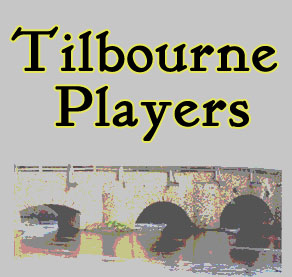The Cemetery Club by Ivan Menchell
Click here for pictures of the production.
Review in the Farnham Herald:
Tilbourne Players’ performance brings real life to
The Cemetery Club
Directed by Noel Thompson, the Tilford group’s latest production was Ivan Menchell's The Cemetery Club. A simple story set in New York about three mature Jewish widows, long-time friends, who meet once a month for tea, then visit their husbands' graves in the local cemetery. There's quiet, graceful Ida, beautifully played by Sara Wilson-Soppitt, happy in her memories of late spouse Murray and in no hurry to move on with her life. Her character contrasts starkly with Brezetta Thonger’s’ convincing portrayal of brash, over the top, party ‘girl’ Lucille, now apparently getting payback against her late philandering, real-estate agent husband, Harry. The trio is completed with still-grieving widow Doris, obsessively devoted to dear departed husband Abe, and generally disapproving of her two friends’ outlooks on widowhood, another fine character interpretation by Sarah Burch, a welcome newcomer to the troupe of Tilbourne Players.
For those unfamiliar with the plot, all has been plain sailing for the past three years until the arrival of Ian Wilson-Soppitt as Sam, a shy butcher whose deceased wife is buried in the same cemetery as the widows’ husbands. Sam is immediately pounced on by predatory Lucille, but it's Ida that Sam sets his cap for. The budding romance threatens to destroy the women's friendship not only because Lucille wants Sam for herself but, as the play develops, Lucille and Doris make a selfish, misguided attempt to save Ida from potential heartbreak by sowing the seeds of doubt about Sam’s true feelings for her and vice versa.
Before reaching the dramatic tipping point in their sparky, bickering relationship, the three women produced some hilarious comedy moments. In the scene where, as elderly bridesmaids they prepare to get ready for friend Selma’s fourth wedding, Brezetta Thonger, complete in red wig and dolly-bird dress, bursts onto the stage in an outrageous, over-the-top, man-hungry pose that brought the house down with laughter. It was the cue also to introduce Mildred, Sam’s substitute wedding guest, a cameo role for Jane Quicke.
In the drunken aftermath of the wedding party, Ida discovers her friends' scheme to intervene in her relationship with Sam. The ensuing rift in their relationship is only restored by Doris’s death when her broken heart finally gives out in her sleep. The final curtain sees Ida and Sam together and reveals just how much the real Lucille, not the outlandish, vain predator, is grieving for her husband and now her friend.
Tilbourne’s interpretation of The Cemetery Club was a triumph of skilful direction, finely-honed acting talent and production teamwork worthy of a professional performance. Scene changes between Ida’s home and the cemetery were achieved by Rob Barnard’s intelligent cross-lighting aided by the deft backstage crew camouflaging the living room furnishings and creating the cemetery − symbolised by three prop headstones set on the forestage. The choice of Pachelbel’s Canon as background and inter-scene music served as a solemn reminder of the underlying gravity behind the humorous highlights.
Each actor established a clearly defined role, and was a totally believable, real life character. Menchell’s script provided countless opportunities to deliver classic New York Jewish dialogue with humour, gossipy quips and biting put-downs which the cast handled as a completely natural interplay with no dries, no hesitation, no prompts.
If this is the standard that the Tilford group has set for future productions, we have some theatrical treats in store.
Robert Cray
